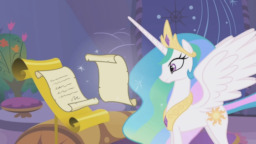
Assumed Innocence
Marecrates was walking down a quiet old lane when in this way he came across her well known associate and student, Celestia
“Celestia my good friend, as you have so recently gained such enormous power over the reins of the state alongside your sister I feel that it is now more important than ever that we are able to challenge one another on just these very issues.” Marecrates exclaimed, approaching her friend.
“And I suppose that you have some question to ask me in that case then?” Celestia asked, knowingly.
“The very thing, and as you seem so eager I will save you the bother of asking me what the question is. As such, do you suppose that it is right for a court of law to assume, prior to the beginning of a trial, that the mare in question is innocent or guilty?” Marecrates asked.
“Well I suppose that it would depend on the circumstances of the crime and character of the man, but overall I’d surely say that it makes more sense for us to assume that she is guilty, for guilty mares are on the whole more likely to be brought forth to the law than innocent, as this is the law’s purpose, to punish the guilty.” Celestia replied.
“Yes this is the case, but you paint in broad strokes my friend. Would it not make more sense to treat individual trials individually?” Marecrates continued to ask.
“I agree.” Celestia replied simply.
“And is not the purpose of the law also to insure the safety of the innocent?” Marecrates asked.
“Yes.” Celestia again replied.
“And would you not say that this purpose trumps that of punishment, as punishment mainly serves to dissuade others from committing a similar crime, thus endangering the innocent public?” Marecrates asked.
“Of course. Other than a crude sense of vengeance it seems to me that the law serves us best when other potential wrongdoers see it’s cruel punishments, and as a result are more weary to commit any cruelty themselves against others.” Celestia added.
“Well then my friend, I must present you with four scenarios, all involving the crime of murder.” Marecrates began.
“Let us say that in the first case that mare in question is innocent and is judged to be innocent by the court. In the second she is guilty and is so judge to be guilty by the court, being executed for her crime. Now we can make our little moral quandary a lot easier by putting these two cases aside, as in both the court has upheld its purpose and delivered a just verdict.”
“The other two cases as we shall see however are of another variety entirely. In the first the mare is innocent, yet she is found guilty and put to death. In the second the mare is guilty of his crime and is found to be innocent, being wrongly set free.”
“In one case an innocent mare most certainly dies, which as we have just said goes directly against the very purpose of the law, to protect the innocent. In the other a guilty mare trots free, which while a wrong in of itself in this case there is only a possibility that she may recommit his crime, which however large must necessarily be less than the almost certainty of the innocent mare being put to death in the other case.”
“In one case an innocent mare dies, in the other there is merely a possibility that an innocent mare may be killed sometime in the future. Now which would you say my dear Celestia is the worse of the two?” Marecrates finished.
“Surely the certainty of a wrong is worse than the mere possibility?” Celestia asked back.
“Then is it not right that in cases where we are uncertain of the guilt or innocence of the accused, and our suspicions have no concrete reason to sway greatly towards either side that we must assume that he is innocent of any crime, and treat her as such, for by simple mathematics the probability of wrong being done to an innocent is far higher in any case in which, despite ambiguity, we were to execute a mare whom we did not know to be innocent or guilty?” Marecrates asked.
“This does seems to be the case, by pure logical reasoning at least. Although I must admit that I have never thought of the problem in such a way, so I will need some time to think it over. Regardless however, you have certainly disturbed my once unquestioned stance and yet so neatly put the matter, and I must thank you for that.” Celestia said, graciously thanking her old friend.
“It is no trouble to me at all, I assure you. I’m just happy to be given the opportunity to spur such honest questioning.”
